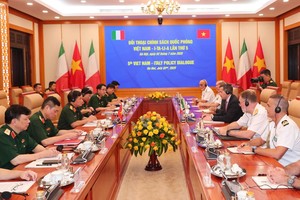Russia could soon sign a contract with a U.S. space company on the delivery of Soviet-era rocket boosters in support of the development of the Taurus II space launch vehicle, a Russian newspaper said on Wednesday.

A series of NK-33 rocket engine tests were successfully completed in early March by Russia's United Engine Corporation/SNTK in Samara. The basic NK-33 engine was originally designed and produced in Russia in late 1960s for the Russian N1 lunar launch vehicle.
The Vedomosti newspaper cited SNTK executive director Nikolai Nikitin as saying that details of a future delivery contract are being discussed with its U.S. partners, Aerojet and Orbital. He did not disclose the value of the deal.
"Aerojet bought about 40 NK-33 engines in mid-1990s, paying $1 million for each unit. The U.S. company has 30 engines at present and will need 20 for 10 launches to the International Space Station," Nikitin said.
"The price for newly delivered engines should be much higher," he said, adding that comparable RD-180 space engines are sold to the U.S. by Russia's Energomash company for $6 million.
The Taurus II launch vehicle is still in development by Orbital, but the company already has a $1.9 billion contract with NASA for eight cargo missions to the International Space Station (ISS) from 2011 through 2015.
Aerojet purchased approximately 40 of the NK-33 engines in the mid-1990s and, under contract with Orbital. The company is currently modifying the engines specifically for the first stage of the Taurus II launcher.
Ron Grabe, Orbital's executive vice president and general manager of its launch systems group, said after the tests that the success of the NK-33 engine tests in Russia was an important step forward in the development of the Taurus II.
According to estimates, the U.S. companies will need more than 70 NK-33 engines in 2016-2020.
Nikitin said SNTK has about 40 engines in storage but would have to restart production if the U.S. contract is signed.
The resumption of production would cost the company about 4 billion rubles (over $135 million), the official said.
The NK-33 engine has the highest thrust-to-weight ratio of any first-stage rocket engine, and is considered by most characteristics the highest performance rocket engine ever created.








)















